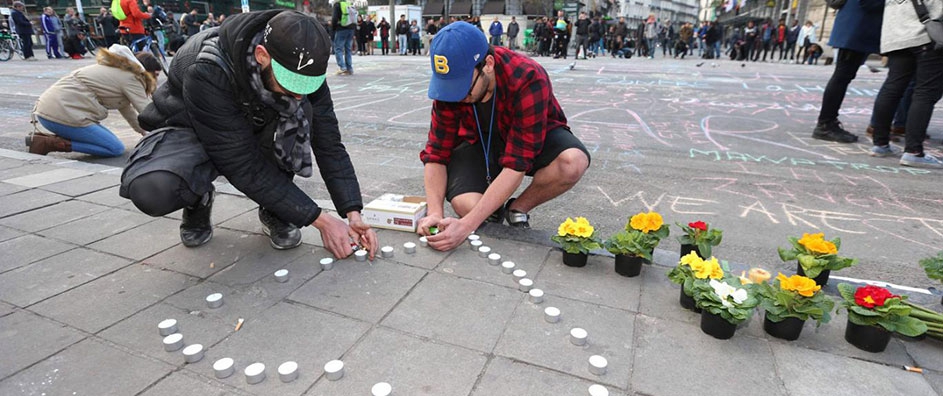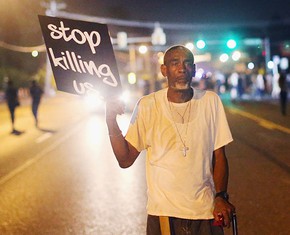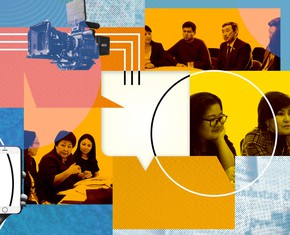The views expressed in our content reflect individual perspectives and do not represent the authoritative views of the Baha'i Faith.
The divine religions must be the cause of oneness among men, and the means of unity and love; they must promulgate universal peace, free man from every prejudice, bestow joy and gladness, exercise kindness to all men and do away with every difference and distinction. – Abdu’l-Baha, Selections from the Writings of Abdu’l-Baha, p. 28.
Yesterday terrorist bombs tore through the Brussels airport and main metro station, killing dozens of innocent people and wounding hundreds more.
Europe and the United States have now suffered from an increasing number of terrorist attacks during the past several months. Those attacks have exploited the openness and vulnerability of Western societies, with their personal freedom, accessible public spaces and relatively unimpeded travel across national borders. Terrorist groups like ISIL and al Qaeda have vowed to continue attacking European and American targets, threatening additional assaults on the West.

This overall situation shows no signs of abating anytime soon. The bombs used in the Brussels attacks, crude devices filled with nails to inflict maximum casualties, were set off by suicide bombers intent on creating chaos and fear, and willing to give up their own lives to do so. Unbelievably, anyone with the wrong motivations can now make and deploy such a weapon—the materials are readily available just about anywhere, and finding step-by-step bomb-making instructions is simple. As long as terrorists believe the West can be held responsible for the bloody conflicts in their parts of the world—and frankly, as long as the West continues to fight proxy wars in the Middle East with troops, bombs and drones—these random killings of innocent civilians will likely continue.
So what can we do about it?
The Baha’i teachings have three very specific suggestions: international unity, an increasing level of integration and oneness in our segregated cities, and a concerted, culture-wide drive to eradicate religious prejudice.
First: one of the most persistent problems stopping the world from effectively combatting terrorism comes from its fragmented, dis-unified and non-communicative intelligence networks. Many European countries, for example, do not share intelligence about known terrorists and their associates with neighboring countries. Distrust and historical prejudices contribute to the problem. Some of those nations even have competing security agencies within their own national bureaucracies that do not readily share intelligence with each other.
If the European Union could reduce the barriers to sharing security information, overcome the old historical animosities and prejudices between nations, and more effectively communicate relevant intelligence data among its member states, the threat of more attacks could be significantly reduced. If the nations of the world united in their determination to stop terrorism, they could actually accomplish it. Only their lack of unity stands in the way.
Second: many European countries, and many large cities in the Americas, have inadvertently—or perhaps purposely—created insular refugee ghettoes in their midst. The largely Muslim populations in those urban areas, often clumped together in poor neighborhoods rather than evenly distributed and integrated into the wider society, tend to continue cultural practices and prejudices brought from their home countries. Such forced insularity and segregation can breed a sense of separation from the new host country; foment a distrust of law enforcement; lay the foundations for continued hatred; and provide hiding places for jihadists that effectively shield them from discovery and prosecution.
If Europe and North America could make concerted efforts to end the practice of segregating refugee and immigrant populations, and stop allowing the common practice, whether intentional or not, of creating ghettoes that prevent the enculturation and absorption of large groups of people from other places, then we could begin to disperse the populations of potential terrorists and jihadists. That kind of dispersal would speed the process of integration and unification.
Accomplishing that long-term goal will obviously take concerted effort on the part of many sectors of Western society. We can begin right now, on an individual and personal level, by intentionally reaching out, meeting and connecting with the people who now live in the immigrant enclaves within our own cities. Only by reducing estrangement, getting to know and befriending people from different religious and cultural traditions, and breaking down the barriers between cultures can we start to effectively integrate and unify our societies.
Third: effective counter-terrorism doesn’t just mean intelligence and integration—it also means ridding ourselves of the prejudices that have traditionally plagued disparate Faiths. Building understanding, connection and unity between religions is the ultimate solution for terrorism. It will construct a bulwark against the separation, the mistrust and the resultant violence that disunity and separation always produce:
Religious hatred and rancor is a world-consuming fire, and the quenching thereof most arduous, unless the hand of divine might give men deliverance from this unfruitful calamity.
Beware of prejudice; light is good in whatsoever lamp it is burning. A rose is beautiful in whatsoever garden it may bloom. A star has the same radiance if it shines from the east or the west.
All the prophets of God have come to unite the children of men and not to disperse them; to put in action the law of love and not enmity.
We must banish prejudice. Religious, patriotic, racial prejudices must disappear, for they are the destroyers of human society.
We must become the cause of the unity of the human race. – Abdu’l-Baha, Divine Philosophy, p. 25.
















Comments
Sign in or create an account
Continue with Googleor